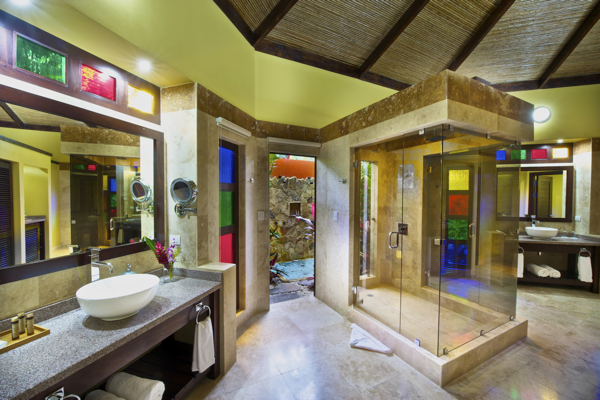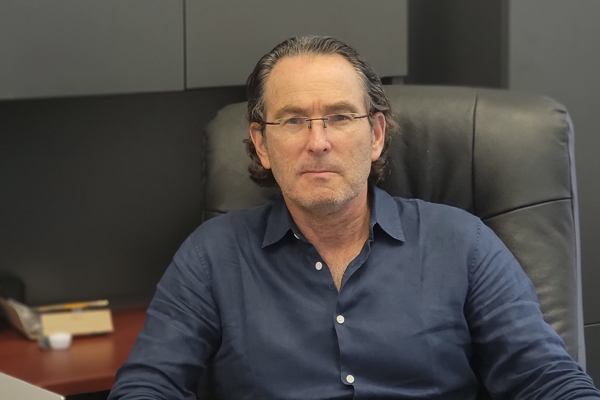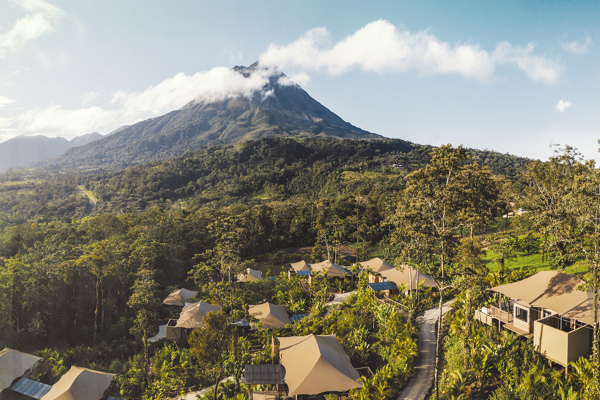Leo Ghitis had reached a stage in life where he was starting to realize he had to think more about how he could impact the world and leave a legacy. A native of Cali, Columbia, he came to the United States as a 17-year-old, eventually earned a Harvard MBA and became a successful real estate developer – first with Trammel Crow and then on his own. Then, some 20 years ago, in his mid-40s, a set of circumstances landed him in the rainforests of Costa Rica trying to help a friend of the family salvage a struggling 3-star, 20-room hotel with multiple partners. Through the process of buying out the partners to take a majority interest in the original Nayara, he recognized a new calling that included a love for service, hospitality, and the incredible importance of sustainability, which soon led him to create a credo: being a force for good is good for business.
Today, after repositioning the original property as an ultra-luxury destination with open-air restaurants, freestanding villas, private pools all steeped in the local cultural, Ghitis has three hotels in Costa Rica with some 400 employees and rates ranging from US$800 to US$1,500. He created one of the first luxury tented camps in Central and South America with the addition of Nayara Tented Camp in December 2019 and has Nayara hotels with partnerships in the Atacama Desert and Easter island in Chile.

Ghitis, who still works with one of the original partners, has at least another three properties under development – one in Costa Rica and two in the Caribbean – and he says the phone rings all the time these days with other developers looking to work together.
The two joint venture developments on one of the biggest islands in the Caribbean include a tented camp with about 60 units and another 60-key luxury product in what Ghitis calls glorious locations on the high point of the island. “We’re hoping that these are going to be the two most spectacular hotels in the Caribbean,” he stated.
Ghitis, now 63, said one of the keys to his success has been being a good listener, doing what travel advisors suggested and picking everyone’s brain without any preconceived notions. Now, the other motto for Nayara is to make sure that no guests ever leave unhappy, and Ghitis empowers his team to do whatever is necessary to succeed.

“As a brand, customer service is an obsession,” Ghitis said. “People even joke with me that it’s a religion – that we are a sect because all we talk about is customer satisfaction. And that’s the foundation of all our success.”
His timing getting into the business was fortuitous, Ghitis said, because the internet was starting to explode with reviews. “Someone called me and said, ‘Hey, did you see that TripAdvisor named you the seventh most romantic hotel in the world?’ And my answer was, ‘who is TripAdvisor?’” The word got out and spread like wildfire.
Nayara mission
The underlying philosophy and mission at Nayara is to go beyond sustainability towards regenerative travel – not just slowing environmental impacts but actively restoring nature to its previous glory through reforestation projects and investment in the local community.
For example, a mountain in Costa Rica was being decimated by cattle ranchers and the Nayara team stepped in to plant 20,000 trees. After failing at their reforestation efforts, the team found an Australian expert who knew how to sequence the plan and today the site is thriving and Ghitis is moving forward with a tented camp development. “There were no butterflies, no birds, nothing” he recalled. “Nowadays, you go up to the look into camp and there are sloths, monkeys, birds. There is everything, which proves that if we bring the forest, the rest of the wildlife will follow.”

The team is also involved with local institutions and local charitable organizations and encourages guests to visit them as well as support them financially on a continued basis. Nayara also provides childcare for all employees, as well as healthcare for employees and their direct families.
Construction is done in such a way to lessen its impact, ranging from the way they treat sewer and storm waters, to reforestation projects, and power supply to help guests reduce the amount of electricity they use. “Being sustainable is very good business,” Ghitis said. “People call us because they want to learn about the things that we’re doing… We were very lucky that our guests believe in the same things that we do… Reforestation efforts resonate, and people care about the things that we care about and want to come to that.”
Development strategy
While growth opportunities persist and there are actually six hotels in various stages of development, including one in the Middle East, the idea is not to make Nayara very big. “The idea is to have the most special hotels anywhere in the world,” Ghitis added. “I look for unique locations. I don’t want to go where everybody else is going. So, I want to be in deserts and rainforests, at incredible beaches that are private. I want to go to places where there’s incredible native culture, a lot of history with archaeological remains. I want people that come to the hotel to learn.”
Rooms pencil out anywhere from about US$300,000 to US$600,000 per key, and while sourcing local artisans is preferred, certain FF&E is coming from the outside, especially Indonesia and Africa, and challenges persist. Generally speaking, Ghitis said sourcing goods costs five or six times more than it used to.

For example, Ghitis said containers coming out of Indonesia used to cost about US$5,000 a piece; now they are US$30,000. “And that’s if you’re lucky. When there are containers, there are no ships, and when there are ships there are no containers. Finally, we got our hands on a couple of containers a weeks ago and they were all full of holes.” Eventually, Ghitis found someone in Indonesia who could fix the containers.
In South Africa, where Nayara was sourcing fabric for tents and facing growing COVID-related challenges, the answer eventually became flying in the fabric, which was outrageously expensive. But, again, there were no ships, and it took three months to get a plane.

But attention to detail and finding the right amenities seems to be paying off for Ghitis and Nayara. “Our hotels are all freestanding villa products and typically they have oversized plunge pools, private gardens, and outdoor showers… We always appeal to that traveler that wants privacy and luxury at the same time, while remaining in contact with nature.”
It all comes back to being a force for good. “Even if your motive is purely dollars and cents, just economic, just know that you will do so much better if you take care of the environment, the community and your employees,” Ghitis concluded.

